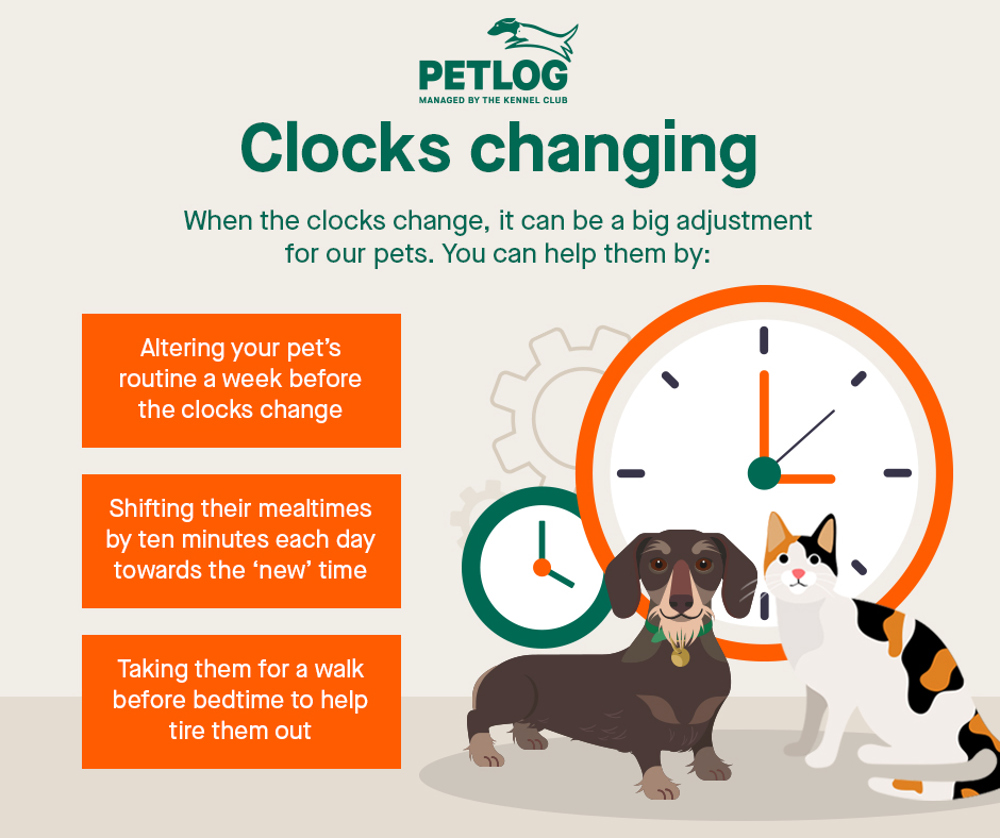
On the final Sunday in March, the clocks in the UK spring forward an hour, giving us brighter mornings and longer evenings. In October, the clocks go back an hour on the last Sunday of the month. When the clocks change it’s helpful to support our pets and adjust their routines gradually to reduce their levels of stress and anxiety.
How the clocks changing may affect your pet
Our pets have an internal clock that’s set by levels of sunlight and tells them when to eat, sleep and wake up. Changes in levels of sunlight happen slowly over the course of the year, but how do sudden changes affect our pets?
Despite our pets not being able to physically tell the time, changes to their schedules can cause confusion and stress. We set our pet’s routines, they get up when we wake up, eat breakfast, go to work, take them for walks, it is the shift in these schedules that can cause them stress.
This is why it is important to gradually change our pet’s wake up time, meals and bedtimes so that they do not notice the clock change. If your pet has a fixed routine, try adjusting their routine by 10 minutes each day, starting a week before the clocks change.
Top tips for helping your dog with the clocks going forward
- Adjust your pet’s feeding and medication schedule before the clocks go back
- Re-schedule their feeding times by 10 minutes earlier each day
- Take them on a nice walk before bedtime
- Adjust their toilet break times
Clocks going forward routine
In the run-up to the clocks going forward, you can prepare your pet a little bit each day, but you need to be organised. It’s important that you do not force your pet to wake up earlier, as this could cause them stress. Make gradual changes to help them adjust, such as giving them their breakfast 10 minutes earlier over a week-long period.
Follow suit in the evenings. If your pet has a specific bedtime, try adjusting their dinner-time to be 10 minute each day in the lead up to the clocks changing. Many pets do not go to bed straight after dinner, which may make adjusting a little harder, but by creating a comfortable and calm setting 10 minutes earlier, it may encourage them to sleep. You can also take them on walks, or give them their daily exercise before bedtime, to help tire them out.
Clocks going back routine
By preparing your pet for bed a little bit earlier each day a week it can help them adjust when the clocks change. Never force your pet to go to bed earlier as this can create a stressful environment for them. Make small changes, such as making their meal times 10 minutes later each day. This will encourage them to wake up later knowing that they will receive food, helping them, to gradually adjust their body clocks.
Carry on making these adjustments for your pet’s evening routine. For example, making their dinner time 10 minutes later each day throughout the week, putting them to bed 10 minutes later and taking them for a walk or giving them exercise earlier in the day rather than before bedtime.
Possible effects of the clocks changing
Increased levels of anxiety and stress
Our pets are creatures of habit, whose lives usually depend on having some type of routine. Often when our daily routines change, then so do our pets, which can cause mild stress. Adjusting their schedule gradually will help to reduce stress levels as much as possible for them.
Separation anxiety
Once the clocks go forward and the nights get lighter, humans are more likely to spend more time outside. This can mean that if your pet is being left alone for long periods of time every day, they can develop separation anxiety. This can be hugely stressful for some pets, particularly dogs, and can lead to changes in their behaviour and mood.
More time outside
Often, the increase in daylight can create a new lease of life in dogs. This can make many pets want to go outside more. As nice as this is to witness, be mindful of the dangers that come with your pet being outside more often. Dangers can include adder bites, wasp and bee stings, slug and snail pellets and heat stroke.
Hotter weather
Clocks going forward means we are beginning to see better weather as we step into spring. Some months have seen record soring heat waves. It’s important to keep our pet as cool as possible during this time. There are many ways to do this, please see our ‘how to keep my dog cool in the summer’ page.
Top tips for helping your dog with the clocks going forward
- Adjust your pet’s feeding and medication schedule before the clocks go back
- Re-schedule their feeding times by 10 mins earlier each day
- Take them on a nice walk before bedtime
- Change their toilet break times
